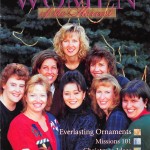My thought in considering Christmas traditions after more than thirty years in Africa where our two children grew up, was ‘Why should our Christmas celebration be just like home? Where is home?’
Why not make Christmas a special “field” experience, especially if there are established Christian customs in your country?
Or, what are the needs of older children who have memories of Christmas in their home country? What’s important for them to keep connected?
Can you make some new “traditions” that open opportunities to share the true meaning of Christmas? As our two children were growing up, we usually invited a Liberian family for a Christmas dinner and little gift exchange for the kids. Dessert was always a cake in the shape of a Christmas tree, appropriately decorated with green icing, strings of popcorn, miniature Christmas tree balls, and candles on the “branches”. And we sang “Happy Birthday” to Jesus, and read the Luke account. Sometimes we shared a little story about the three trees in Jesus life (cradle, boat, cross—not original). Along with stockings for the kids, we had one for Jesus, and each time we opened a gift we put a money gift in Jesus’ stocking, so we would keep remembering that it was His birthday, and that all good gifts come from Him. This part may or may not have included our guests, depending on where they were spiritually. The money went for some special Liberian ministry that we as a family were involved in or wanted to support.
Christmas Celebration Ideas From Around the World
Each year, around the world, Christmas comes in many shapes and sizes. Wrapped in boxes decorated by cultures and weather, religion and traditions, Christmas is celebrated in many different ways. We have presents labeled “Home for the Holidays”, “Holiday divided between two sets of parents,” and “A long way from Home.” Sometimes, those are the only Christmas celebration packages that we see. But, there are many more varieties.
When we lived in Venezuela, we enjoyed opening the present marked, “Gathering of the global working family for a Christmas brunch and huge potluck lunch.” This one involved two potlucks in one day! We also enjoyed opening the “Let’s take Christmas to a remote base.” We loved worshipping with the Indians and taking dinner to the global working family. The visit was complete after a cool swim in the beautiful, jungle river. Another package we liked to open was “Let’s invite an isolated global working family to come visit us for the holiday.” It was fun to share our home and hospitality with global working friends and to minister encouragement to them.
Your Christmas packages may look different than mine, but each of us has at least one specially wrapped box in common. It’s the present marked “Our Lord with us.” He never leaves us, excludes us, forgets us or abandons us to our homesickness or loneliness. Each time we look to Him for our Christmas joy, He will provide it in full. Our cups will overflow with His grace and mercy toward us.
Ideas for enhancing your Christmas celebration
- Adopt an older global working couple to spend some or all of the Christmas holiday with you. Not only can they be substitute grandparents for your children, but you may ease any loneliness they may be experiencing.
- As a family, bake Christmas cookies to share with your neighbors and friends. Deliver them while singing Christmas carols.
- Have a Christmas block party for your neighbors. Play games, potluck local food and goodies, have a piñata (if you live in Latin America) and show the “Jesus” film. Share the good news of Christ’s birth with those who may not yet understand.
- When you receive Christmas cards from home, take time to share them with your children and use them as prayer reminders for those who pray and give so you can serve where you do.
- A wonderful book to help you celebrate each holiday is Let’s Make a Memory, by Gloria Gaither and Shirley Dobson.
Linda Swanson served with her husband and their two children for 16 years in Venezuela, Ecuador and California with Mission Aviation Fellowship.
©1998 Thrive
View the original print magazine where this article was first published.


